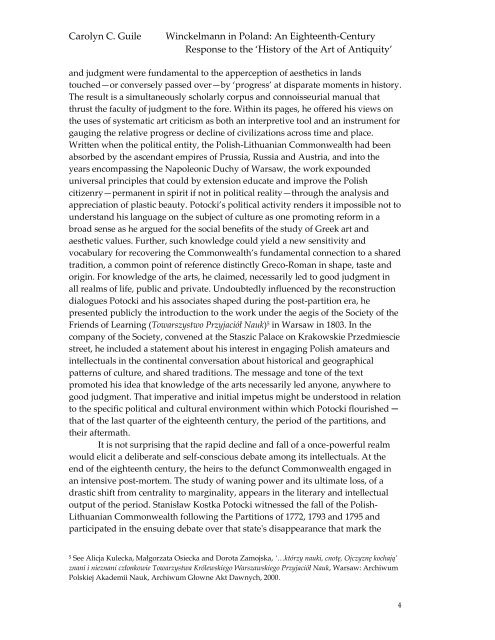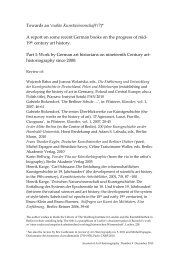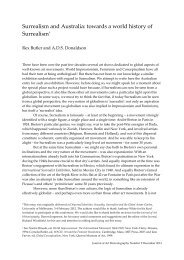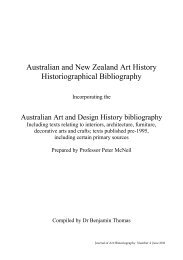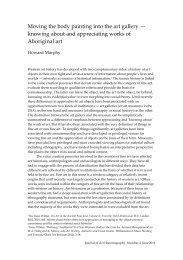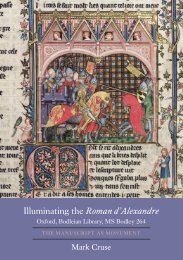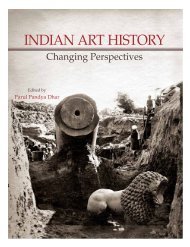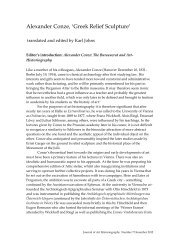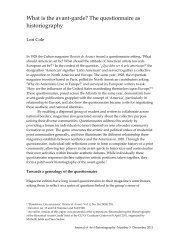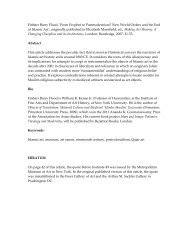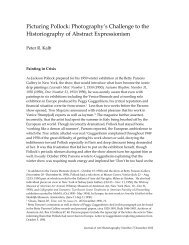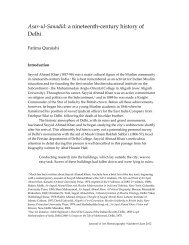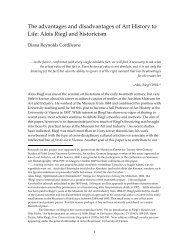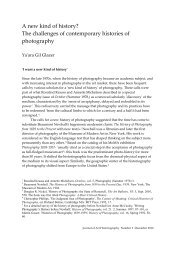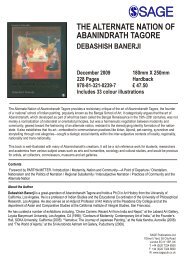9/CCG1 - Journal of Art Historiography
9/CCG1 - Journal of Art Historiography
9/CCG1 - Journal of Art Historiography
Create successful ePaper yourself
Turn your PDF publications into a flip-book with our unique Google optimized e-Paper software.
Carolyn C. Guile<br />
Winckelmann in Poland: An Eighteenth-Century<br />
Response to the ‘History <strong>of</strong> the <strong>Art</strong> <strong>of</strong> Antiquity’<br />
and judgment were fundamental to the apperception <strong>of</strong> aesthetics in lands<br />
touched—or conversely passed over—by ‘progress’ at disparate moments in history.<br />
The result is a simultaneously scholarly corpus and connoisseurial manual that<br />
thrust the faculty <strong>of</strong> judgment to the fore. Within its pages, he <strong>of</strong>fered his views on<br />
the uses <strong>of</strong> systematic art criticism as both an interpretive tool and an instrument for<br />
gauging the relative progress or decline <strong>of</strong> civilizations across time and place.<br />
Written when the political entity, the Polish-Lithuanian Commonwealth had been<br />
absorbed by the ascendant empires <strong>of</strong> Prussia, Russia and Austria, and into the<br />
years encompassing the Napoleonic Duchy <strong>of</strong> Warsaw, the work expounded<br />
universal principles that could by extension educate and improve the Polish<br />
citizenry—permanent in spirit if not in political reality—through the analysis and<br />
appreciation <strong>of</strong> plastic beauty. Potocki’s political activity renders it impossible not to<br />
understand his language on the subject <strong>of</strong> culture as one promoting reform in a<br />
broad sense as he argued for the social benefits <strong>of</strong> the study <strong>of</strong> Greek art and<br />
aesthetic values. Further, such knowledge could yield a new sensitivity and<br />
vocabulary for recovering the Commonwealth’s fundamental connection to a shared<br />
tradition, a common point <strong>of</strong> reference distinctly Greco-Roman in shape, taste and<br />
origin. For knowledge <strong>of</strong> the arts, he claimed, necessarily led to good judgment in<br />
all realms <strong>of</strong> life, public and private. Undoubtedly influenced by the reconstruction<br />
dialogues Potocki and his associates shaped during the post-partition era, he<br />
presented publicly the introduction to the work under the aegis <strong>of</strong> the Society <strong>of</strong> the<br />
Friends <strong>of</strong> Learning (Towarszystwo Przyjaciół Nauk) 5 in Warsaw in 1803. In the<br />
company <strong>of</strong> the Society, convened at the Staszic Palace on Krakowskie Przedmiescie<br />
street, he included a statement about his interest in engaging Polish amateurs and<br />
intellectuals in the continental conversation about historical and geographical<br />
patterns <strong>of</strong> culture, and shared traditions. The message and tone <strong>of</strong> the text<br />
promoted his idea that knowledge <strong>of</strong> the arts necessarily led anyone, anywhere to<br />
good judgment. That imperative and initial impetus might be understood in relation<br />
to the specific political and cultural environment within which Potocki flourished ─<br />
that <strong>of</strong> the last quarter <strong>of</strong> the eighteenth century, the period <strong>of</strong> the partitions, and<br />
their aftermath.<br />
It is not surprising that the rapid decline and fall <strong>of</strong> a once-powerful realm<br />
would elicit a deliberate and self-conscious debate among its intellectuals. At the<br />
end <strong>of</strong> the eighteenth century, the heirs to the defunct Commonwealth engaged in<br />
an intensive post-mortem. The study <strong>of</strong> waning power and its ultimate loss, <strong>of</strong> a<br />
drastic shift from centrality to marginality, appears in the literary and intellectual<br />
output <strong>of</strong> the period. Stanisław Kostka Potocki witnessed the fall <strong>of</strong> the Polish-<br />
Lithuanian Commonwealth following the Partitions <strong>of</strong> 1772, 1793 and 1795 and<br />
participated in the ensuing debate over that state's disappearance that mark the<br />
5 See Alicja Kulecka, Małgorzata Osiecka and Dorota Zamojska, ‘…którzy nauki, cnotę, Ojczyznę kochają’<br />
znani i nieznani członkowie Towarzystwa Królewskiego Warszawskiego Przyjaciół Nauk, Warsaw: Archiwum<br />
Polskiej Akademii Nauk, Archiwum Głowne Akt Dawnych, 2000.<br />
4


